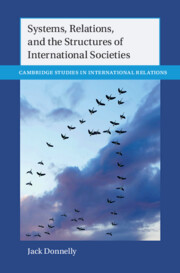Book contents
- Systems, Relations, and the Structures of International Societies
- Cambridge Studies in International Relations
- Systems, Relations, and the Structures of International Societies
- Copyright page
- Contents
- Figures
- Tables
- Acknowledgments
- Part I Systems, Relations, Levels, and Explanations
- Part II Waltzian Structural Theory
- Part III Systems, Relations, and Processes
- Part III (A) Differentiation and Continuous (Trans)Formation
- Part III (B) Four Excursions in Relational/Systemic IR
- 14 Normative-Institutional Differentiation
- 15 Vertical Differentiation
- 16 Levels, Centers, and Peripheries
- 17 Continuous (Trans)formation of Eurocentric Political Systems (c. 1225 – c. 2025)
- 18 Afterword
- References
- Index
- Cambridge Studies in International Relations
14 - Normative-Institutional Differentiation
from Part III (B) - Four Excursions in Relational/Systemic IR
Published online by Cambridge University Press: 19 October 2023
- Systems, Relations, and the Structures of International Societies
- Cambridge Studies in International Relations
- Systems, Relations, and the Structures of International Societies
- Copyright page
- Contents
- Figures
- Tables
- Acknowledgments
- Part I Systems, Relations, Levels, and Explanations
- Part II Waltzian Structural Theory
- Part III Systems, Relations, and Processes
- Part III (A) Differentiation and Continuous (Trans)Formation
- Part III (B) Four Excursions in Relational/Systemic IR
- 14 Normative-Institutional Differentiation
- 15 Vertical Differentiation
- 16 Levels, Centers, and Peripheries
- 17 Continuous (Trans)formation of Eurocentric Political Systems (c. 1225 – c. 2025)
- 18 Afterword
- References
- Index
- Cambridge Studies in International Relations
Summary
This and the following chapters offer substantive applications of a relational/systemic understanding of international systems. This chapter looks at how international actors are differently placed (and shaped) by their authority, status, and roles; by the principles, norms, and rules that govern their actions; and by the institutions and practices in which they participate. The chapter offers three illustrations. First, I suggest that international systems can profitably be understood as having constitutional structures composed of principles and practices of international legitimacy, principles and practices of domestic legitimacy, foundational functional practices, and hegemonic cultural values. Second, I look at the great variety of types of security systems, including (various types of) systems organized around unit autonomy, systems of hierarchical subordination, and transnational security communities. Finally, I look at the transformation of post-World War II international society through norm-driven processes that abolished aggressive territorial war and overseas colonial empires.
Keywords
- Type
- Chapter
- Information
- Publisher: Cambridge University PressPrint publication year: 2023



